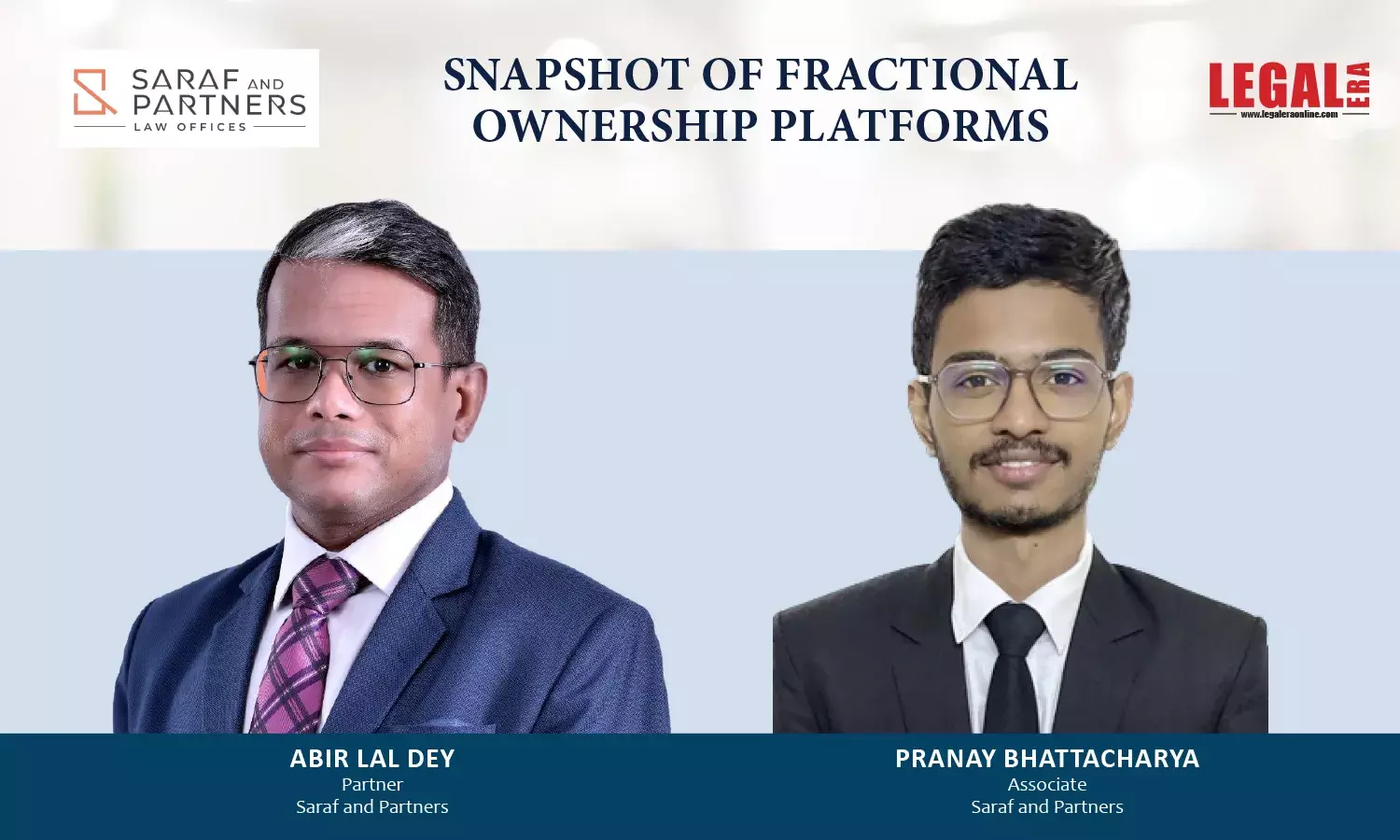Snapshot Of Fractional Ownership Platforms

Snapshot Of Fractional Ownership Platforms Currently FOPs are formed under various SPV structures such as private company or trust or limited liability partnership, which requires different regulatory compliances and the nature of documentation from legal standpoint.FRACTIONAL OWNERSHIP Fractional ownership is a collaborative investment model where multiple investors jointly hold a fraction...
Snapshot Of Fractional Ownership Platforms
Currently FOPs are formed under various SPV structures such as private company or trust or limited liability partnership, which requires different regulatory compliances and the nature of documentation from legal standpoint.
FRACTIONAL OWNERSHIP
Fractional ownership is a collaborative investment model where multiple investors jointly hold a fraction of an asset, often high-end properties or commercial spaces. These investments can be made through web-based platforms know as Fractional Ownership Platforms (“FOPs”) offering fractional ownership of real estate assets. Each individual in the FOP is the co-owner holding certain percentage or share of such real estate asset instead of paying the full price.
The minimum investment on FOPs often ranges from Rs. 10 lakhs to 25 lakhs. The returns and incomes generated by the FOPs are distributed to the investors subject to management / maintenance fees and other charges, costs and expenses.
SETTING UP A FOP
The structure of setting up a FOP is as follows:
1) The FOP identifies the real estate asset for acquisition;
2) The identified real estate asset is listed on the FOP with details like minimum investment amount, lock-in period, asset details (residential or commercial) etc. and investors are invited to subscribe to securities seeking expression of interest (EOI) from public with token amount.
3) On receipt of 100% EOI, the placement memorandum to subscribe to the securities issued by the SPV (private limited company or the trust) which will purchase the real estate asset, or which own the real estate asset are forwarded to the investor.
4) The investor transfers the amount to the escrow account.
5) The SPV purchases the real estate asset from the pooled funds received from the investors.
6) The investors are allotted the securities and become owners of such properties to the extent of their investments.
Extending the regulatory framework by REIT Amendment Regulations to cover the scope of FOPs has been helpful to largely address some concerns and provide an impetus for the growth of this market.
STUCTURING AND LEGAL FRAMEWORK GOVERING FOPs
(a) Securities and Exchange Board of India (SEBI)
The SEBI (Real Estate Investment Trusts) Regulations, 2014 (“REIT Regulations”) governs investment made by investors in real estate investment trust (“REIT”) registered with SEBI created for holding and managing real estate assets. The trustee overseas the activity of the REIT and the manager has the operational responsibilities.
To foster the growth of fractional ownership investment, the SEBI vide notification dated on 8 March 2024 has amended the REIT Regulations (“REIT Amendment Regulations”) by introducing to Small and Medium Real Estate Investment Trusts (“SM REITs”) to regulate the FOPs. SM REITs are nothing but a category of REITs, introduced to facilitate smaller investors’ entry into the real estate investment market with relatively smaller amounts of capital.
Prior to REIT Amendment Regulations, a REIT meant a “trust” under the Indian Trusts Act, 1882. However, the definition of REIT under regulation 2(zm) of the REIT Amendment Regulations has been broadened to mean “person” that pools Rs 50 crores or more for the purpose of issuing units to a minimum of 200 investors in order to acquire and manage real estate assets or properties. Therefore, SM REITs shall also be covered under the REIT Regulations, which shall be a treated as trust under the provisions of the Indian Trusts Act, 1882 with an ability to establish separate and distinct scheme/s for owning of real estate assets through wholly owned SPV. However, any “company” that acquires and manages real estate asset(s) or property(ies) and offers or issues securities to the investors shall not be construed as a REIT.
(b) Companies Act, 2013
A FOP operating through SPV shall fall under the provisions of the Companies Act, 2013. Such SPV in the form of “company” is required to comply with various regulatory requirements under the Companies Act, 2013 including filings with the Ministry of Corporate Affairs (“MCA”), tax obligations, and adherence to real estate regulations under Real Estate (Regulation and Development) Act, 2016 for the unlisted securities of the SPV formed as a private company. In case of a “public company”, the provisions of relevant SEBI regulations must also be complied.
(c) Limited Liability Partnership
A FOP operating through limited liability partnership (“LLP”) shall fall under the provisions of Limited Liability Partnership Act, 2008 (“LLP Act”). Unlike a company, LLPs cannot raise funds by onboarding investors or go public. So, each unitholder in the LLP will own assets proportional to their investment. Hence, as per Section 22 of the LLP Act, on the incorporation of a LLP, the persons who subscribed their names to the incorporation document shall be its partners and any other person may become a partner of the LLP in accordance with the LLP agreement.
(d) Real Estate (Regulation and Development) Act, 2016 (RERA)
As per REIT Regulations, there is no mandatory requirement to register FOPs under the RERA. But, given that FOPs operate as real estate agents and brokers before the property is purchased and as property managers post-acquisition, it may be ascertained that FOPs will be within the ambit of “real estate agent” under Section 2(zm) of RERA for registration purposes.
It is pertinent to note that the relevant persons developing the real estate projects for the FOP portfolio shall have to comply with the provisions of RERA. Any non-compliance of RERA may impact the FOP investors.
(e) Indian Trusts Act, 1882
The main law that governs the creation and administration of trusts in India is the Indian Trusts Act. The Act defines a trust as “an obligation annexed to the ownership of property and arising out of a confidence reposed in and accepted by the owner, or declared and accepted by him, for the benefit of another, or of another and the owner”. Therefore, the if the FOP is operating under the SM REIT then the SPV shall be set up as a “Trust” under the provisions of the Indian Trusts Act, 1882 with ability to establish separate and distinct scheme/s for owning of real estate assets through wholly owned SPVs constituted as a company under the Companies Act, 2013.
(f) Other regulations applicable to FOPs
Presently, FOPs do not fall within the purview of any financial sector regulator such as RBI, SEBI (except under REIT), etc. Therefore, most FOPs unless regulated by the regulator are as of now not compulsorily adhering to the Prevention of Money Laundering Act, 2002 (PMLA) and KYC / AML norms in relation to the activities undertaken by FOPs.
MODELS OF ESTABLISHING FOP
(a) Setting up FOP under SEBI REIT Regulations: A FOP can be set up by formation of a SPV either as a “Trust” or a “Limited Liability Partnership” subject to the conditions that such SPV shall have an asset size of minimum Rs 50 crores or more for the purpose of issuing units to at least 200 investors. The investors of the trust are treated as unitholders of the Trust and the Trust shall be set up under the Indian Trusts Act, 1882 and registered under the REIT Regulations.
(b) Setting Up FOP outside of SEBI REIT Regulations: Alternatively, a FOP has the option to set up an SVP as a private limited company by offering its securities to the prospective investors who recognised as shareholders and/or debenture holders by making private placement offer letter under Form PAS-4 as per Section 42 of the Companies Act, 2013.
OUR ANALYSIS
At present, the FOPs are formed under various SPV structures such as private company or trust or limited liability partnership, which requires different regulatory compliances and the nature of documentation from legal standpoint. While the FOPs are gaining traction in the market it is expected that the regulators will frame further rules to ease out the process and protect the investors. Nonetheless, extending the regulatory framework by REIT Amendment Regulations to cover the scope of FOPs has been helpful to largely address some concerns and provide an impetus for the growth of this market.
Disclaimer – The views expressed in this article are the personal views of the authors and are purely informative in nature.





